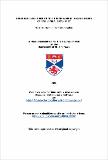Political violence in the Third World: a case study of Sri Lanka
Abstract
Political violence in Sri Lanka is not a unique phenomenon. It is
a prevalent tendency in many countries of the Third World. Sri Lanka,
since 1971, has experienced a sharp escalation of political violence
which renders it suitable as a case study of insurgency and guerrilla
warfare in developing countries. The author's major thrust is a
comparative review the causes, patterns, and implications of the leftwing
Insurrection of 1971 and the Tamil guerrilla warfare up to the
Indo-Sri Lanka Accord in June 1987. This thesis highlights the
salient socio-economic and political factors, underscoring the view
that ethnicity is the impetus behind the continuing turmoil in Sri
Lankan society.
The author's main hypotheses are that the Insurrection of 1971 as
well as the subsequent Tamil guerrilla warfare were pre-planned and
well-organised, and that the politically violent organisations in Sri
Lanka were mainly a result of the emergence of new social forces which
came about due to socio-economic and political transformations.
The analysis begins with a review of the theories of political
violence. Of these theories Huntington's theory of modernisation
relates more closely to the origin of the political violence movement
in Sri Lanka. The awakening of the earliest guerrilla group, the
Janatha Vimukthi Peramuna (J. V. P. ), in 1971 lay deeply rooted in
socio-economic and political factors. The emergence of the Tamil
guerrilla organisations stemmed from the long-standing competition
between the Sinhala majority and the minority Tamils for limited
socio-economic resources and exclusive political powers. The study
shows that the socio-economic background of the leaders and members
were diverse and often paradoxical, if not at odds to the groups'
goals. The ethno-nationalist ideologies, strategies and tactics of
the guerrilla organisations, instiled group consciousness and goaded
otherwise ordinary citizens to commit political violence. The pattern
of political violence in Sri Lanka was a highly emotive expression of
anti-establishment and secessionist convictions on the part of the
guerrillas. Finally, the study proposes politico-economic reforms
rather than military options to cope with the problem of political
violence in Sri Lanka.
Type
Thesis, PhD Doctor of Philosophy
Collections
Items in the St Andrews Research Repository are protected by copyright, with all rights reserved, unless otherwise indicated.

